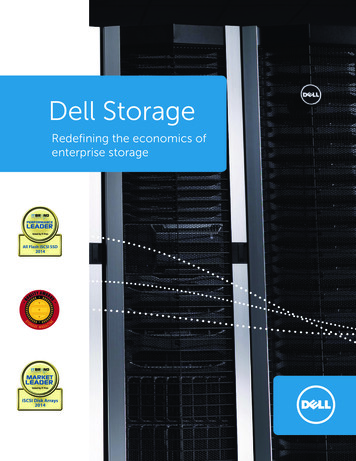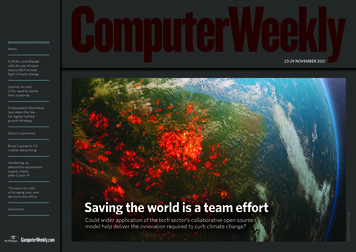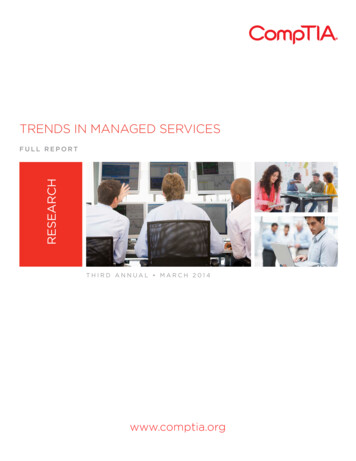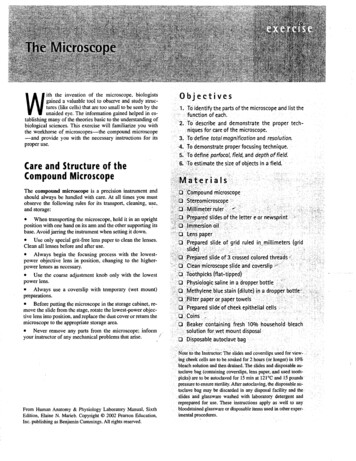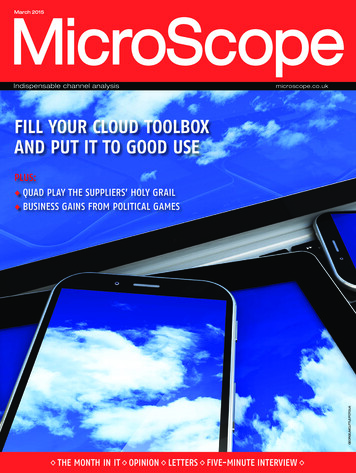
Transcription
MicroScopeMarch 2015Indispensable channel analysismicroscope.co.ukFILL YOUR CLOUD TOOLBOXAND PUT IT TO GOOD USEGEORGEJMCLITTLE/FOTOLIAPLUS: QUAD PLAY THE SUPPLIERS’ HOLY GRAIL BUSINESS GAINS FROM POLITICAL GAMES THE MONTH IN IT OPINION LETTERS FIVE-MINUTE INTERVIEW
the month in the channelGlobal server market grows in2014, report IDC and GartnerCompetition for skilled IT staff torise as more opportunities open upThere is cautious optimism amongindustry watchers after both IDC andGartner reported growth in the globalserver market last year. IDC put globalrevenue for the fourth quarter of 2014at 14.5bn, representing 1.9% yearon-year growth, while total revenuefor the year was 50.9bn, a 2.3% riseon 2013. Gartner reported revenuegrowth of 2.2% for the fourth quarterof 2014, with overall revenue for theyear growing by 0.8%.Problems recruiting skilled staff arelikely to increase as the employment options for those with the rightcredentials are set to expand further,according to specialist IT recruiterRobert Half Technology. Researchby the firm revealed that 36% of UKfirms are planning to expand their ITworkforce in the first half of 2015 tohelp support projects and initiativescreated to foster and support growth.Claranet sounds alarm over theinnovation failings of MSPsManaged service providers (MSPs)risk disappointing their customersif they fail to support innovationplans and should work more closelywith users to ensure they can delivervalue, according to research fromClaranet. The study found as manyas half of UK organisations were notmeeting expectations from usersthat had hoped they would be getting expert advice from people whowere innovators.Cisco shares rally above 30A flurry of product launches atMobile World Congress this monthsaw Cisco stocks rally above 30 forthe first time since 2007. The networking kingpin launched the USC8000 small cell base station as partof a collaboration with SpiderCloud.The 4G/Wi-Fi system is to be soldthrough channel partners, withVodafone being the first to offer theUSC 8000 to its enterprise customers.Big Blue spending big buckson emerging business areasIBM expects nearly half of its revenueto come from emerging businessessuch as cloud, analytics, security andmobile by 2018. At its annual investor meeting in New York, executivessaid that by 2018 they expect 40bnin annual revenue to come from highgrowth areas such as cloud and security, shifting IBM away from its reliance on non-renewable tin. Cloud,analytics, mobile, social and securitysoftware currently represent approximately 25bn of IBM revenue.SMEs turning away from creditDespite rejection from banks andtraditional sources of credit, SMEsstill need to be encouraged to consider alternative forms of finance.According to the latest BDRCContinental SME Finance Monitor,almost half of small firms (43%)are now classed as permanentnon-borrowers with no plans to useexternal finance, and only 37% of theSME population used some sort offunding last year.Daily channel news at MicroScope.co.ukMicrosoft Windows XP marketshare continues to increaseNearly 14 years on from its initial release, Microsoft Windows XP has increasedits market share for the second month in a row.According to figures from NetMarketShare, the Microsoft operating system(OS) had a 29.53% share of the market in February, up from 29.3% in January.In December, the figure was 28.98%, showing that despite Microsoft’s bestefforts, the legacy OS isn’t ready to retire just yet.Microsoft ended extended support for XP in April 2014 and did everything inits power to convince users that Windows 8 was a viable upgrade. Butconsumers and businesses alike have continued to shun the touch-friendlyoperating system in favour of older operating systems. In fact, the most recentfigures suggest that Windows 7 and Windows XP hold a combined marketshare of 76.84%, while Windows 8 and 8.1 account for just 10.68%.All eyes will now be on Windows 10, which is due to launch in the secondhalf of 2015. Microsoft recently announced that all Windows 7 and Windows 8users would be entitled to a free upgrade to the latest OS. But whether or notthe company can persuade XP loyalists to defect remains to be seen.HP to acquire Aruba NetworksHewlett-Packard is to acquire wireless networking company Aruba Networksfor 2.7bn. The cash deal of 24.67 per share is expected to close in thesecond half of HP’s fiscal 2015.Aruba shares shot up by 35% after Bloomberg reported that discussionswere taking place.“Enterprises are facing amobile-first world and arelooking for solutions that helpthem transition legacy investments to the new style of IT,”said HP CEO Meg Whitman(pictured).“By combining Aruba’sworld-class wireless mobilitysolutions with HP’s leadingswitching portfolio, HP will offerthe simplest, most securenetworking solutions to helpenterprises easily deploynext-generation mobilenetworks,” she added.HP’s acquisition of Arubarepresents the largest deal sinceit bought Autonomy, which sawan 8.8bn write-down for theCalifornia-based companyfollowed by an inquiry by the USJustice Department.BSA makes link between piratedsoftware and malware infectionThe software industry has workedhard to provide users with reasonsnot to use illegal software, rangingfrom the use of pirated discs to fundterrorism to the risk of malware beingpackaged with the application. Areport from the Business SoftwareAlliance (BSA) has added weightto that second point, showing thatcountries with high levels of unlicensed software also have increasedcases of malware.Low-cost notebooks continueto fuel PC market growthThe UK continues to be a strong market for desktop PCs and laptops, with2015 starting in the same vein as 2014as unit shipments remain in doublefigures. The latest numbers fromanalyst house Context revealed thatthe UK delivered 19.1% year-on-yeargrowth in PC shipments in Januaryand 20.1% growth in the fourth quarter of 2014, with the channel noticinga positive Christmas hangover of lowcost consumer notebooks.Channel businesses losing sightof worker safety, Daisy study findsNearly half of channel businesseshave insufficient measures in placeto protect staff when working alone,according to research by DaisyGroup. The study found that despitean employer’s legal obligation toprotect staff, 25% never checkedthe welfare of lone workers and justone in eight staff were aware of theirresponsibility to inform others oftheir whereabouts.MXC Capital wins Calyx ManagedServices auction with 9m bidMXC Capital announced that it hasacquired managed services providerCalyx Managed Services from privateequity firm Better Capital. Multiplebidders were involved in a “competitive auction process”, with MXC’soffer of 9m beating the competition.The deal relates specifically to themanaged services component of theCalyx Group and does not includethe software provider portion of thebusiness, m-hance. MARCH 2015 2
commentSIMON QUICKE EDITOR’S COMMENTBILLY MACINNES OPINIONAre you ready to plug IBM apps could divorcethe resources gap?hardware foreverLast month Claranet released research thatindicated managed service providers wereseen as potential partners that could helpdeliver innovation as well as hosted services.With the decline in resources in IT departmentscustomers were increasingly hoping their servicespartner could also provide access to a source ofexpertise about how their business should develop.Sadly the research found many were not in a position to do that and, as a result, were leaving customers disappointed, undermining their positions astrusted advisors.This issue takes a look at the current opportunitiesaround cloud and, as Amro Gebreel finds out, thereare plenty of ways a channel player can approachthe topic.There are opportunities in infrastructure, securityand device management and the appetite from thecustomer continues to grow, making it easier togenerate more sales.Some in the channel are preparingfor the day when the CMO has abigger IT budget than the IT directorBut just selling a cloud package is not enough andClaranet’s findings suggest those buying hosted services want much more from a partner, with advice onwhere they should innovate and what sort of decisions they should start thinking about now, to makesure they are technologically in the right place.The pressure on the channel to be more than justan IT supplier will only increase as the people ordering from them start to come from lines of businesswith less of a grasp on IT.Some in the channel are already preparing for theday when the CMO has a bigger IT budget than theCIO – and making sure the demands of those customers can be satisfied is going to be one of thekeys to success.When someone buys a cloud service, they expectit to come from someone who has a firm grip on themarket and is able to provide expert advice aboutjust where the next wave of innovation can comefrom. Fail to do that and the customer will ultimatelygo elsewhere. If you would like details of forthcoming themesrunning in the MicroScope ezine, wish to share yourreaction to this one, or make any other contribution,email squicke@techtarget.com.Daily channel news at MicroScope.co.ukWHILE writing an article on the IBM/AppleMobileFirst alliancefor the next issue ofMicroScope, the fanciful notionoccurred to me that, if this deal issuccessful, it could represent the startof a significant shift in the way IBMdoes business in the years to come.The mobile aspect of the deal, inenabling IBM to develop made-forenterprise apps for iOS devices withcloud services that exploit IBM’s bigdata and analytics capabilities, couldbe an important consideration formany organisations in the future.But in IBM using Apple’s iOS platform to deliver mobile apps, it couldreinforce the message that the company’s future direction is based ondelivering apps that use its big dataand analytics capabilities, rather thanthe hardware platform they run on.IBM has made no secret of itsambitions in cloud, analytics, mobile,social and security software. Itrecently announced plans to invest 4bn into these “strategic imperatives” to help increase revenues from 25bn today to 40bn in 2018 .At first, I thought that, having soldoff its PC and x86 server businesses,it might make sense (if the Appledeal works) for IBM to do somethingsimilar for desktops and servers, bydeveloping apps and providing thehardware the customer required – beit Lenovo, Dell or HP. But, unlike themobile space, many enterprisesalready have PCs and serversinstalled, so IBM might not need tosell and support the hardware, unlessthe customer asked for it.The other thing about the Appledeal is that IBM is delivering apps fora hardware and operating systemplatform manufactured and supported by a single vendor with complete control over the process. Thesame cannot be said for PCs.However, writing and deliveringmade-for-enterprise apps, that exploitbig data and analytics capabilities ata desktop or server level, might notrequire IBM to have much, if any,involvement with the on-premisehardware at all.Quocirca analyst Clive Longbottombelieves IBM’s platform of the futurewill be a “morphing of Softlayer tobecome a Power/x86 platform withmainframe capabilities”. He saysthat, if a customer needs on-premiseIBM MobileFirst apps for iOS: A majorshift towards big data and analyticscapabilities would render the hardwareplatform irrelevantequipment, IBM will try to sell itPower-based gear. If it has to be x86,it will use Lenovo but, “as time goeson, I believe it will just use whateverthe customer wants (as GBS and GTSdo at the moment in many cases, providing Dell or HP servers if themoney is OK)”.Will the same thing eventuallyhappen at the mobile level? Whatwill IBM do on the mobile platform ifcustomers ask for MobileFirst typeapps on Android? According to IBMGlobal Business Services, vice-president & global leader, Banking andFinancial Markets Center ofCompetence, Pablo Suarez, anyjointly developed capabilities as aresult of the MobileFirst for iOS alliance are “limited to IBM MobileFirstfor iOS solutions”.But he adds that the vendor “willcontinue to build multi-platformfunction and support developerswith capabilities like Bluemix [itscloud platform-as-a-service], IBMMobileFirst Protect and tools likeCloudant [database as a service]. IBMwill integrate for other devices at therequest of individual clients”.That’s all well and good but itsounds a tad ad hoc, compared to theMobileFirst for iOS initiative. If theIBM/Apple alliance is successful inits objectives, the iOS platform couldwell gain a significant advantage overAndroid and Windows at the enterprise level. Not that Longbottom isconvinced, suggesting the alliancewill “just wither on the vine as themarket goes ‘meh’”.But even if he’s right, theMobileFirst alliance will have servedits purpose in demonstrating IBM’scapability to develop apps that harness its big data, analytics and cloudcapabilities and deliver them to amobile platform. MARCH 2015 3
technologyCONSUMER TELECOMSQuad play the suppliers’ holy grail –regardless of customer propositionTelcos are pre-occupied with bundling consumer services – but can they make it work? Sean McGrath reportsAs the telecoms marketundergoes a period of rapidchange, all the major players are briskly realigningtheir strategies to ensure they aren’tleft behind; and the buzzword of themoment is undoubtedly “quad play”.Offering TV, broadband, fixedline and mobile services all underone roof, quad play is apparentlywhat we have always wanted; wejust never knew it. From the userperspective, it simplifies billing andcould reduce costs. From the serviceprovider’s perspective, it’s all aboutcustomer retention and what betterway to retain customers than to givethem everything they want? That’sthe official party line at least; the reality is that quad play is a by-productof an evolving landscape.ISTOCKSupplier profilesBT, which already has a successfultriple play platform (TV, broadbandand fixed line), is undoubtedly thebiggest agitator in this war. Shouldthe deal with EE go ahead, BT wouldhave an automatic chokehold on allfour pillars of technology. Not onlywill it own the UK’s (current) largest mobile network, but will havea robust television package and thelargest number of broadband andfixed line subscribers in the country.This prospect is causing uneaseamong the competition. Sky, whichalso runs a successful triple playbusiness, is now in talks to form apartnership with O2 to create a virtual mobile arm of the business. Talksare currently underway betweenThree and O2 and, if that deal goesahead, that network will overtake EEas the largest in the country. All of asudden, Sky is a contender for quadplay champion.Virgin Media was one of the first toget its four ducks lined up and remainsa potent force in the quad play market.“You need it,” they told usduring the 3D TV wars a fewyears ago. The only problemwas, we didn’t need itThe company has figured out the secretformula when it comes to bundlingservices. Somewhere in the region of65% of its customers use at least threeof its products; a statistic its rivals haveyet to match.Vodafone is one of the largestmobile service providers on theplanet and has been beating the drumof converged services for over a decade – in enterprise circles at least. Italready runs successful quad playplatforms on the continent but hasbeen cautious to act on its home turf.However, it seems high on the agendaIf the prospect of handling three billsis simply too much to bear, quad playwill be an undisputed successDaily channel news at MicroScope.co.ukfor CEO Vittorio Colao and it nowlooks inevitable that the mobile service provider will have a go at fourplay later this year.And then there is TalkTalk. Whilemany might dismiss the budgetbroadband provider as a serious contender, TalkTalk is one of the selectfew that has had its eye of the quadplay prize for some time. The provider had a deal with Vodafone,which it ditched last year in favour ofO2. Combined with its YouView TVplatform and the recent acquisition ofTesco’s BlinkBox, TalkTalk has positioned itself to take a decent chunk ofthe pie. This is reflected in its quarterly results, which show total revenue for the quarter up 4.2%, year onyear, to 449m.But do we really need it?The big question behind all this jostling and vying for position is – why?Is there a genuine customer proposition behind the quad play race or iseveryone doing it simply because theother guy is doing it?The whole scenario is reminiscentof the 3D wars in television a fewyears ago. All of a sudden, a TV wasno good if it didn’t include the latestin 3D technology and all of the vendors jumped on the bandwagon.“You need it,” they told us. The onlyproblem was, we didn’t need it. Wedidn’t even want it. It made ourheads hurt.If the prospect of handling threeseparate bills is simply too much formodern society to bear, quad playwill be an undisputed success.But the reality is that the futureof quad play depends on whetheror not the marketing engines cansell the dream to us – and, with somuch invested in quad, they probably will succeed. MARCH 2015 4
TODOR TCVETKOV/ISTOCKthe cloud pitchFill your cloudtoolbox and putit to good useAmro Gebreel finds out what opportunitiescloud technology presents for resellersand where their efforts would be bestplaced to support business growthIt would be easy to switch offwhen people start talking aboutcloud. The subject is not onlyworn out, but is one that meansso many different things to so manypeople. As a result of that jaded confusion, there is a danger that someof the potential opportunities cloudpresents could be missed.MicroScope garnered opinionsfrom across the channel about whatcloud technology could offer resellers this year and where efforts wouldbe best placed for those looking togrow their businesses. The goodnews is that there are plenty of suggestions, and with MicrosoftWindows Server 2003 support ending in July, it is a good time to encourage those running on traditional setups to look at a hosted alternative.Pave the way for SMEs“The next 12 months will be theprime time for resellers to step upand dominate the SME market, takingDaily channel news at MicroScope.co.ukan increased share of SME customertelecoms and IT services. This yearwill hold continued growth in cloudproducts and services, supported by afurther drive to a more mobile-centricworking approach and sustainedrapid growth and requirement fordata connectivity solutions,” saysGraham Harris, product director forcloud at Daisy Wholesale.“Hosted desktop will be an important product for us next year, as wesee the idea of virtualisation movefrom server level to desktop and storage. Even more so with the loomingdeadline of Server 2003 andWindows XP retirement, channelpartners will find themselves in anideal position to guide SMEs awayfrom traditional infrastructure to avirtual hosted desktop environment.As more and more businesses opt tomove away from traditional IT, Ibelieve channel partners are in thebest possible position to offer a virtualised solution,” he adds.“As businesses opt to move awayfrom traditional IT, channel partnersare in the best possible position tooffer a virtualised solution”Graham Harris, Daisy WholesaleAs well as using Windows Server2003’s demise as a starting point, theongoing challenges of managingdiverse devices and making sure thenetwork – whether on-site, hybrid orhosted – is fully secure present further opportunities.Management of systemsAshley Leonard, president and CEOat Verismic, says the channel community, particularly managed serviceproviders (MSPs), need to arm themselves with a simple, cloud-basedsystems management tool.“PCs and laptops are not goingaway, despite the rush to adopt tablets and smart devices. PCs and laptops need managing, monitoring,patching and licensing. Windows 10will likely create a flurry of upgradework, application compatibility testing and roll-out,” he says.“MSPs need a systems management tool that combines the cloudwith agentless end-device setup, soMARCH 2015 5
the cloud pitchThe Windows Server 2003 opportunityWith support for Windows Server 2003 winding down in July, the time is right for resellers to pitch an alternative. NickEast (pictured), CEO of Zynstra, believes the end of support for Server 2003 and Small Business Server 2003 will beone of the biggest opportunities for the channel this year.Recent surveys suggest approximately 35-68% of the UK’s small and medium-sized enterprises (SMEs) are stilldependent on the operating systems somewhere in their business.“While some think that the end-of-support will drive SMEs to the pure cloud model, that is not the whole story.Research we conducted with the Cloud Industry Forum last year found that cloud adoption among SMEs had risento around 75% penetration, and a hybrid model of cloud services mixed with on-premise IT has become thefirm preference.“Resellers have a vital role to play in a company’s decision to adopt the cloud. They are the consultants who can tailora service to match the SME clients’ needs and ensure they have a successful upgrade path to cloud-based services.This is especially so for companies which are migrating from Server 2003.“But resellers can also promote hybrid IT as a means to ensure they can generate a steady stream of recurringrevenue for themselves. Predictable subscription-based revenues are undoubtedly an attractive prospect,” he adds.“This approach will accelerate in 2015, driven largely by end customers demanding more IT-as-a-service solutions.Those resellers which are ready and able to capitalise on this opportunity will emerge as the winners in 2015.”they don’t need to deploy and maintain another piece of software atevery customer site and on everyPC,” he says.Elsewhere, the focus is on security,with Francois Daumard, AVG’s vicepresident of global channel sales,keen to stress the need to deal withthe challenges of securing mobiledevices, cloud-based apps and thegrowing number of objects that areconnecting to the internet and corporate network as part of an internet ofthings (IoT) movement.“Competition in the cloud space isintensifying. Shrinking margins innon-IT segments, such as VoIP/officecopier/print services, are driving newplayers into offering managed IT services. To stand out from the crowd,resellers have to treat every customerdifferently according to their business needs rather than force them topick from a limited range of cookiecutter services,” says Daumard.“Another factor affecting resellersthis year is the fact that average customer sizes are falling as SMEs seekto take advantage of cloud applications to deliver more affordable services. Management technology is alsogetting simpler. Cloud-based serviceplatforms are emerging that alloweverything to be managed remotely,eliminating any need to have yourown advanced remote administrationor complex scripting tools on-site,”he adds.“Successful resellers will be thosethat change their approach. Thismeans not leading with IT solutions,but instead solving customers’ overall business pain points. Break-fix/annual renewals are out, tailor-maderetainer packages are in,” saysDaumard.One of the biggest security challenges for the IT department is livingin a world with widening frontiers.The advice from Werner Thalmeier, aDaily channel news at MicroScope.co.uksecurity expert at Radware, is to carefully go with that trend, but to workwith the best partners to ensure thebest result.Cloud-based commsThere should also be some opportunities in the unified communications space as the growing mobileworkforce drives demand for morecollaboration tools.“More and more they will wantthese solutions, such as MicrosoftLync and Cisco WebEx, deliveredfrom the cloud and paid for on a revenue basis due to the flexibility, agility and budgeting advantages this canoffer,” says Andy Clark, channeldirector at MeetingZone.“For resellers, this provides a differentiated way of securing long-termrevenues and building closer andsustainable relationships with customers, through which to provideadditional services,” he adds.Tony Martino, managing director ofTollring, highlights an increasingdemand for call management applications for hosted and cloud telephonythat are easy to deploy and offer thesame level of analytics and overallfunctionality as on-premise systems.There is also big demand for callmanagement apps on mobile devices.“We are also seeing a significantincrease in enquiries from customersreviewing business processes andexisting communications strategiesas they consider migrating to cloudbased offerings,” he says. “We see theevolution and availability of businessintelligence solutions, with the samelevel of functionality that is presentin on-premise offerings, as one of thekey factors behind the adoption ofcloud telephony services. The impactof cloud technology has been disruptive, creating a major shift in theindustry away from complexity andtowards business value.”The other advantage of the cloud isthe flexibility it provides some of thesmaller companies looking to punchabove their weight.“With services now available inthe cloud, gone are the days whensuch systems were deployed solelyin large enterprises. This means theseproducts are now accessible not justto large corporates, but to a huge SMEmarket,” says Martino.“Cost-effective call recording,together with innovation in call“To stand out from the crowd,resellers have to treat everycustomer differentlyaccording to their businessneeds rather than force themto pick from a limited range ofcookie-cutter services”Francois Daumard, AVGMARCH 2015 6
management solutions with unifiedcommunications and customer relationship [CRM] integration, hasmeant this market is now takingadvantage of powerful cloud solutions that deliver real business intelligence. Resellers now have theopportunity to sell a ‘solution’ thatevery business can benefit from anddeliver a return on their telecomsinvestment,” he adds.Advice and supportUltimately, the cloud will growthis year because of the focus ofthe vendor community on driving their technology in that area.Gillian Crewdson, channel directorat Mimecast, points to the increasingfocus on Microsoft Office 365 as anideal barometer for the channel.“We know many businesses arestill hesitant to deploy Office 365 dueto ongoing compliance and securityconcerns. Others are taking theplunge, but quietly admit they are notentirely confident they have appropriate resiliency in place,” she says.“For Office 365 deployments togrow, the channel has an importantrole to play in educating customerson how best to remove complete reliance on Microsoft or any other singlevendor. Many resellers were traditionally concerned about the impactthe cloud would have on their businesses,” adds Crewdson.“Resellers have had to adapt tonew revenue models and invest intechnical resources as they grow theirservices business. This investment ispaying off as most organisations needa great deal of advice and support todeploy a new platform like Office365,” she says.Cloud is the futureTony Smith, sales director for theindirect channel at Unify, speaks formany when he describes the cloudas something that is here to stay andis permeating more of our day-to-daylives with each passing month.“With telephony servicesnow available in the cloud,gone are the days when suchsystems were deployed solelyin large enterprises. Theseproducts are now accessibleto a huge SME market”Tony Martino, Tollring“From a reseller perspective, it’sincredibly important to have a finger on the pulse of the latest andgreatest cloud technologies. Regularhealth checks and updating of theenterprise’s cloud strategy will beessential in helping resellers’ clientsto avoid expensive mistakes or“Resellers should aim to be perceivedas strategic business advisors by thec-suite, helping clients take advantageof cloud technologies in a way thatsuits their business processes”Scott Holmes, ColtThe changing conversationScott Holmes, cloud services sales director at Colt, has been talking to businesses in the channel. Here, he shares histhoughts about how cloud is changing the channel landscape.“The role of a typical reseller is evolving as we face a digital transformation. To fulfil the needs of customers in this newworld, which entails bring your own device, shadow IT and the internet of things, resellers need to adapt if they are goingto remain competitive,” says Holmes.“The focus has shifted from what cloud technologies companies should deploy to how they can use this technologyto transform their IT and unlock capabilities that will further drive profit. Technology needs to be viewed as an enabler forbusiness change,” he adds.“Channel businesses should start ensuring that they are involved in business decision planning meetings held bytheir customers, to not only understand their customers’ businesses, but also to be able to provide IT strategy roadmaps that help meet business objectives.“The aim is to be perceived as strategic business advisors by the c-suite, helping companies take advantage of cloudtechnologies in the best way that suits their business processes,” he concludes.Daily channel news at MicroScope.co.ukmissed market opportunities, as themarket is moving at such an incredible rate,” he says.Smith believes this year is aboutenabling flexibility and deliveringcollaboration into the modern dayworkplace while still maintainingreliability. The world is in transitionand, although ‘cloud’ is a conceptthat has been doing the rounds forthe past few years, there are stillplenty only just embarking on theirhosted journey and lots of supportthat the channel needs to deliver.The year ahead will provideopportunities in unified communications, management and security, andcould change long-established desktop tools in favour of somethinghosted or virtual.But there will still be a need for thereseller to consider the political andcultural side of a sale. Cloud can bese
the software provider portion of the business, m-hance. HP to acquire Aruba Networks Hewlett-Packard is to acquire wireless networking company Aruba Networks for 2.7bn. The cash deal of 24.67 per share is expected to close in the second half of HP’s fiscal 2015. Aruba shares

